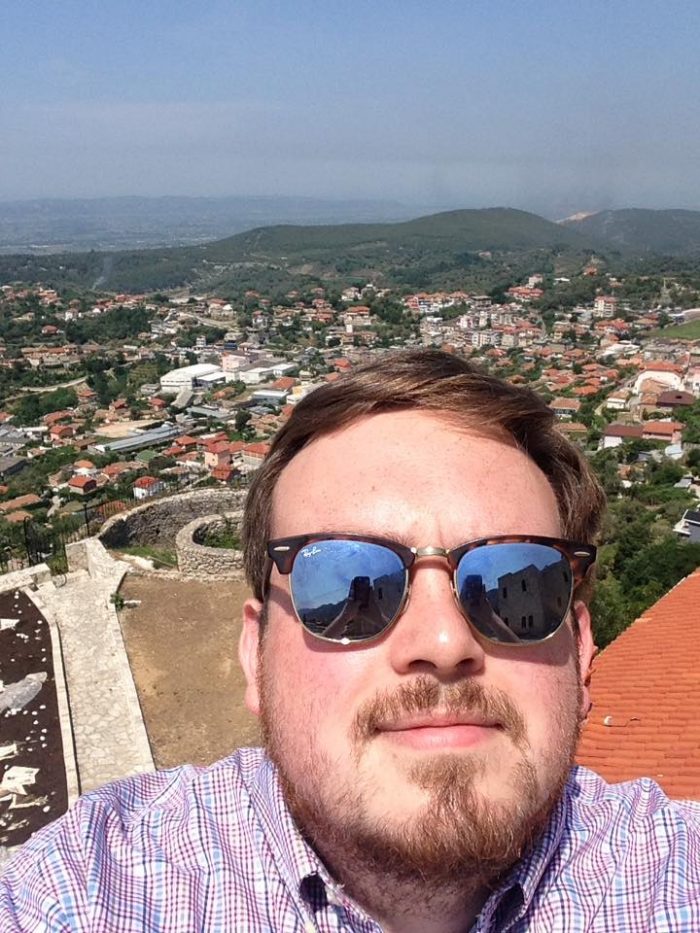 Colby Qualls, a concurrent-degree student at UA Little Rock William H. Bowen School of Law and Clinton School of Public Service, recently completed his International Public Service Project in Albania. Qualls interned at the Albanian Institute of Public Affairs where he helped with research and advocacy related to democratization, good governance, and development.
Colby Qualls, a concurrent-degree student at UA Little Rock William H. Bowen School of Law and Clinton School of Public Service, recently completed his International Public Service Project in Albania. Qualls interned at the Albanian Institute of Public Affairs where he helped with research and advocacy related to democratization, good governance, and development.
What was your Public Service Project, and what did it entail?
My Public Service Project was a 10.5 week internship with the Albanian Institute of Public Affairs in Tirana, Albania. The organization itself focuses on research and advocacy related to democratization, good governance, and development. My project was a little more amorphous because I was generally assisting the organization with various projects and conferences that came up rather than spearheading my own. I was involved with a project proposal and early stages of development of regional development hubs for Albania. I prepared a presentation for and assisted in hosting the Youth Festival of Ideas, a conference related to primary school education. I helped advocate for additional resources to expand an online hub for cyclists in the Balkan area, which is part of an effort to reduce traffic congestion and improve better outcomes in environment and health.
Describe an average work day.
I generally worked Monday through Friday from 9:00 a.m. to 5:00 p.m. I would start each morning with a 40 minute walk to work, and I would end it with the same walk back through a public park. Most days I would spend in the office; however, there were some occasions to travel to a school for an event in a city an hour or two away from Tirana.
I was one of a staff of five. My day revolved around researching or proofreading articles or proposals, and preparing presentations. Occasionally, my colleagues would ask me to explain unfamiliar English words they came across in research. “Stigma” was one of the words I remember describing. Regardless of the actual project or assignment, there would almost always be a coffee break or two throughout the day at some cafe near where we worked. Albanians love coffee, and they use coffee breaks as a way of both reinforcing relationships and discussing developments at work. In my experience, coffee breaks were as productive, if not more productive, than typical office meetings.
What were the best professional lessons learned from this experience?
One of the most important professional lessons I learned from this experience was the value of relationship building. To be an effective organization, there needs to be a certain level of trust and camaraderie among colleagues. I noticed that Albanians really put a premium on those relationships, and I think that it serves them well. I learned that it is important to be flexible and open to being outside of your comfort zone. Plans and projects would often change on the fly, so it was necessary to be ready to switch gears at any moment. Finally, I learned how essential communication can be. As someone who encountered a slight language barrier, I became more keenly aware of not only the importance of finding a common language for communication, but being intentional in how you communicate.
How did you spend your free time away from work?
One of my favorite parts of Albania was the cuisine, so I spent a lot of my free time exploring in an attempt to find new places and new dishes that I had not experienced. I also would travel with my roommate, another Clinton School student, and some of our colleagues. Our mini-adventures would range from taking the longest cableway in the Balkans to spend some time up on Mount Dajt to traveling to other Albanian cities, like Kruje, to explore their markets and castles.
What effect, if any, did this experience have on your career pursuits?
I think this trip has encouraged me to consider ways that I could use my legal background in the nonprofit sector and maybe even abroad. While I had already been leaning toward either the public sector or nonprofit sector, I think this experience titled me even more that way.